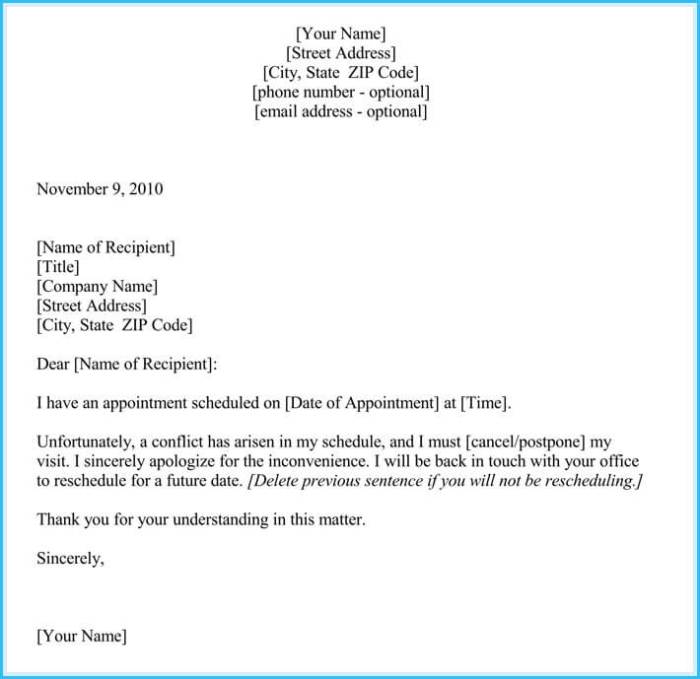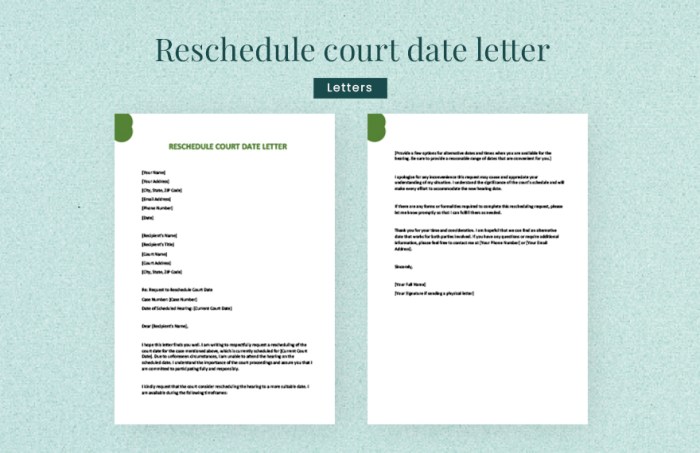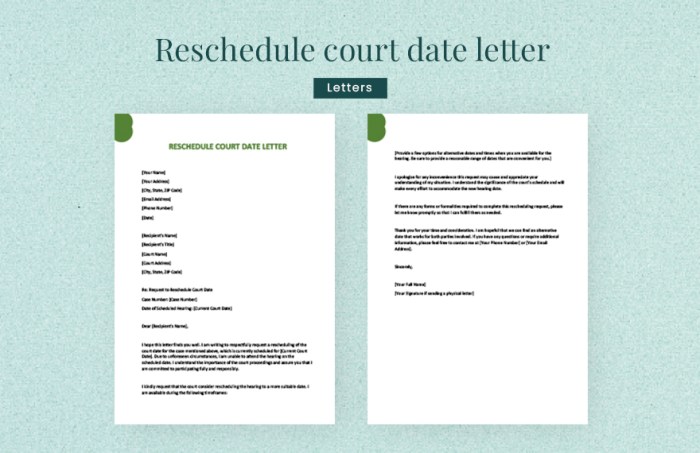Postpone a Court Date sets the stage for this in-depth exploration of navigating court postponements. We’ll delve into the reasons, procedures, legal considerations, and even alternative dispute resolutions to help you understand this crucial legal process. From common reasons for postponement to the nuances of different jurisdictions, this guide aims to be your comprehensive resource.
Understanding the potential consequences and implications of postponing a court date is vital. We’ll examine the impact on all involved parties, including the defendant, plaintiff, and witnesses. This discussion will also cover the potential effect on court schedules and the overall duration of the case.
Reasons for Postponement
Postponing a court date can be necessary for various reasons, impacting the smooth functioning of the judicial system. Understanding the grounds for postponement, procedures, and typical timeframes is crucial for all parties involved. This discussion will explore common reasons, legal grounds, and practical procedures across different court systems.Postponements, when handled appropriately, allow for fairness and due process, ensuring that all parties have a chance to present their case effectively.
However, requests must be supported by valid legal grounds and follow established procedures to be considered.
Common Reasons for Postponement
A postponement of a court date can stem from a variety of situations, impacting the ability of parties to participate. These reasons can be categorized into several groups, including circumstances related to the parties, witnesses, or the court itself.
Postponing a court date can be a real drag, especially when you’ve got a lot riding on the outcome. But sometimes, life just throws curveballs, like when you discover Conor Oberst has covered Tom Petty’s “Walls” watch! It’s a seriously cool find, if you’re into that kind of thing. conor oberst covers tom pettys walls watch So, while you’re waiting for the new court date, you might want to check that out.
Still, getting back to the court date postponement, it’s definitely a headache, but sometimes unavoidable.
- Illness or Injury: A party’s or a witness’s sudden illness or injury can significantly impact their ability to attend court. For example, a serious accident preventing a defendant from appearing or a crucial witness falling ill could lead to a postponement request.
- Witness Unavailability: If a critical witness is unable to attend court due to unforeseen circumstances, such as a sudden relocation or a family emergency, a postponement is often necessary. This ensures the testimony of the witness can be presented in court.
- Unforeseen Circumstances: Unforeseen events, like natural disasters or major disruptions in transportation, can hinder a party’s ability to appear in court. For example, a hurricane shutting down transportation networks, making it impossible for a party to travel to court.
- Scheduling Conflicts: Sometimes, scheduling conflicts can arise, particularly if multiple cases require a party’s presence in court. A significant work or personal commitment can cause a conflict, needing a court date postponement.
- Newly Discovered Evidence: The discovery of new and crucial evidence can necessitate a postponement to allow the court to review and consider this evidence. This ensures a fair trial based on the most complete information available.
Legal Grounds for Postponement
The legal grounds for requesting a postponement vary depending on the jurisdiction and the type of case. These grounds need to be clearly articulated in a formal request to the court.
- Illness or Injury: Medical documentation, such as a doctor’s note, is usually required to support a postponement request based on illness or injury. This helps the court assess the validity of the reason.
- Witness Unavailability: A detailed explanation of the circumstances surrounding the witness’s unavailability, including potential contact information or a sworn statement, is necessary. This is important for the court to determine the legitimacy of the request.
- Unforeseen Circumstances: Documentation of the unforeseen event, such as a police report or news article about a natural disaster, is typically required. This helps the court understand the nature and extent of the disruption.
- Newly Discovered Evidence: A detailed explanation of the nature of the newly discovered evidence and its potential impact on the case is vital. This includes a clear presentation of how the evidence relates to the case.
Procedures for Postponement Requests by Case Type
The procedures for requesting a postponement vary based on the type of court case.
| Case Type | Procedure |
|---|---|
| Criminal | Requires a formal motion filed with the court, outlining the reason for the postponement and supporting documentation. A judge’s approval is required. |
| Civil | Similar to criminal cases, a formal motion is typically filed with supporting documentation. The opposing party has the opportunity to respond. |
| Family | Similar to criminal and civil cases, a formal motion is required, and the opposing party may be given the opportunity to present their arguments against the postponement. |
Timeframes for Responding to Postponement Requests
The timeframe for responding to a postponement request varies by jurisdiction.
| Jurisdiction | Typical Timeframe |
|---|---|
| Federal Courts (US) | Varies depending on the specific circumstances and court. |
| State Courts (US) | Varies greatly by state and the specific court. |
| Other Jurisdictions | Local court rules should be consulted for specific timeframes. |
Impact of Postponement
Postponing a court date, while sometimes necessary, can have significant repercussions for all parties involved. Understanding these potential consequences is crucial for navigating the complexities of a delayed proceeding and ensuring a fair and efficient judicial process. This section will explore the various impacts of a postponement, from its effects on individual stakeholders to its influence on the court’s overall schedule.Postponements, though sometimes unavoidable, can introduce a cascade of consequences.
The ramifications vary depending on the specifics of the case and the circumstances surrounding the request. These impacts extend beyond the immediate parties and can affect the entire judicial system. Careful consideration of these potential outcomes is essential when requesting a postponement.
Potential Consequences for Involved Parties
Postponements can create considerable hardship for the defendant, plaintiff, and witnesses. Each party has unique concerns and potential losses associated with a delay.
- Defendant: A delay might cause anxiety and uncertainty, especially if the defendant is facing significant legal ramifications. The postponement might impact their ability to prepare a robust defense or to continue with their daily life and work, if it affects their employment, for example. A long delay could also create challenges in retaining crucial evidence, potentially affecting the outcome of the trial.
Postponing a court date can feel like a huge setback, especially when you’re already stressed. Imagine the sheer devastation felt by families of those affected by the tragic stage collapse at the Pukkelpop festival, three killed in pukkelpop festival stage collapse. It’s a stark reminder that life can throw curveballs, and sometimes, things are just beyond our control.
Ultimately, a postponed court date is still a date, and with careful planning and a positive attitude, we can all get through it.
- Plaintiff: A postponement might disrupt the plaintiff’s schedule, especially if it impacts their livelihood or ability to move forward with their life. It can delay the resolution of the case and cause emotional distress if the case involves personal matters. The plaintiff might also face challenges in maintaining their case, as the details of the case might fade or change over time.
- Witnesses: Postponements can disrupt witnesses’ schedules and create logistical problems, particularly if they have to travel or take time off work. The longer the delay, the more difficult it may become to recall details, and the potential for their memories to fade becomes a real concern. If the witness has moved or is unavailable due to unforeseen circumstances, a postponement might significantly hamper the ability to gather their testimony.
Impact on Court Efficiency and Case Duration, Postpone a Court Date
A court’s schedule is carefully constructed to manage a significant number of cases. A postponement can disrupt this carefully balanced system.
- Court Schedule: Postponements can disrupt the court’s established schedule, causing delays in other cases and potentially leading to a backlog. This can strain the court’s resources and impact the overall efficiency of the judicial process. The court’s resources are often limited, and a significant number of postponements might overwhelm the system.
- Case Duration: A prolonged postponement can significantly increase the overall duration of a case. This can be detrimental to all parties involved, as it extends the period of uncertainty, anxiety, and potential financial burdens. A delay of several months or even years can affect the availability of evidence, witness testimony, and the ability of parties to prepare for the proceedings.
For instance, a case that initially was expected to last a few months could extend to several years if postponements are frequent.
Importance of Communication and Documentation
Effective communication and meticulous documentation are essential when requesting a postponement. This ensures transparency and clarity for all parties.
- Communication: Clear and timely communication with the court, opposing counsel, and other relevant parties is crucial. A well-written letter explaining the reasons for the postponement, supported by concrete evidence and details, is essential. All parties must be informed promptly.
- Documentation: Proper documentation is vital. This includes detailed explanations of the reasons for the postponement, supporting evidence, and the proposed new date. Maintaining a detailed record of all communications, agreements, and any related documents is crucial for transparency and efficiency.
Procedures for Postponement
Navigating the court system can be daunting, especially when faced with the need to postpone a scheduled court date. Understanding the procedures involved is crucial for a smooth and successful outcome. This section will detail the steps required, illustrate the process visually, and highlight the varying requirements across different jurisdictions.Successfully postponing a court date often hinges on clear communication and adherence to established protocols.
This meticulous approach ensures your request is handled effectively and reduces potential complications.
Requesting a Postponement: Steps Involved
The process for requesting a postponement typically involves several key steps. These steps are often similar across jurisdictions but may vary in specifics. Understanding these steps will help streamline the process and avoid delays.
- Initiation: The first step is formally initiating the postponement request. This often involves contacting the court clerk or relevant court personnel to express your intent to request a postponement.
- Reasoning: Clearly articulate the reason for the postponement. This should be presented in a concise and compelling manner, supporting your need for a reschedule. Avoid vague or unsubstantiated justifications. For instance, a medical emergency or a critical family obligation would be compelling reasons.
- Documentation: Gather necessary supporting documents, which may vary based on the specific circumstances and the jurisdiction. This may include medical certificates, travel confirmations, or other verifiable evidence.
- Filing the Request: Submit the request, including all supporting documents, to the court in the prescribed manner. This may involve filing a formal motion or submitting the request via an online portal. Different courts have varying requirements for filing, so it’s essential to check the court’s website for specific procedures.
- Notification: Notify all parties involved in the case of your postponement request. This often includes the opposing party and the court. The court will likely provide formal notification of the request to all involved parties.
- Court Review and Decision: The court will review the request and supporting documents. The court’s decision will be communicated to all parties. This may be a direct approval or a counter-proposal for a new date.
Flowchart of the Postponement Process
A visual representation of the postponement process can aid in understanding the sequence of events. This flowchart details the typical stages from initiation to final approval. The specific steps may vary depending on the jurisdiction.
[Imagine a simple flowchart here, visually depicting the steps Artikeld above. It would start with “Request Postponement” and branch to “Reasoning”, “Documentation”, and “Filing Request.” Each step would connect to the next, eventually leading to “Court Decision.” The flowchart would visually represent the back-and-forth communication and review process.]
Required Documents and Forms
The specific documents and forms required for a postponement request will vary depending on the jurisdiction and the nature of the case.
| Jurisdiction | Required Documents |
|---|---|
| Federal Court | Motion for Continuance, supporting affidavits, and any other evidence relevant to the reason for postponement. |
| State Court (Example: California) | Motion for Continuance, supporting declarations, medical certificates for illness, or other relevant documentation. |
| Local Court (Example: Small Claims Court) | Written request explaining the reason for postponement, supporting documentation if required by the court. |
Note: Always consult the specific court’s rules and procedures for the most up-to-date and accurate information on required forms and documents.
Effective Communication Strategies
Clear and concise communication is essential throughout the postponement process. This includes:
- Prompt Action: Initiate the request promptly to avoid potential delays or complications.
- Thorough Explanation: Provide a detailed explanation of the reasons for the postponement request, backed by verifiable evidence.
- Professional Tone: Maintain a professional and respectful tone in all communications with the court and opposing counsel.
- Follow-up: Follow up with the court to ensure your request is received and processed appropriately.
Comparing Postponement Procedures Across Jurisdictions
Court systems differ in their approaches to postponements. Some jurisdictions may have stricter rules or requirements compared to others. Thorough research into the specific procedures for the relevant court is crucial.
For example, some courts might require a specific form for a postponement request, while others might accept a letter explaining the situation. The level of supporting documentation required can also differ greatly between courts.
Legal Considerations
Navigating the legal landscape surrounding postponing a court date requires careful attention to established principles and procedures. A thorough understanding of these considerations is crucial for ensuring a smooth and successful outcome. Judges possess significant discretion in these matters, and the outcome often depends on the specific circumstances presented.Judges, as gatekeepers of the court process, have the authority to grant or deny postponement requests.
Their decisions are not arbitrary but are grounded in legal principles designed to maintain fairness, efficiency, and the integrity of the judicial system. Understanding the factors influencing these decisions empowers individuals to effectively present their case for a postponement.
Legal Principles Governing Postponement Requests
Postponement requests are typically evaluated based on the principles of due process, which ensures that all parties involved have a fair opportunity to present their case. This principle underlies the need for a demonstrable reason and appropriate justification for the postponement. The court must balance the needs of the parties with the demands of a timely judicial process.
A compelling argument often hinges on the ability to show that a postponement will not unduly disrupt the court’s schedule or prejudice the opposing party.
Judge’s Discretion in Granting or Denying a Postponement Request
A judge’s discretion plays a pivotal role in deciding postponement requests. While legal principles provide a framework, the specific circumstances of each case ultimately influence the judge’s decision. Factors such as the nature of the case, the potential impact on the court’s schedule, the urgency of the matter, and the reason for the request are all carefully weighed.
This discretionary power allows judges to tailor their rulings to the unique specifics of each situation.
Factors a Judge Might Consider When Evaluating a Postponement Request
Several factors often influence a judge’s decision. These include:
- The nature of the case:
- The potential impact on the court’s schedule:
- The urgency of the matter:
- The reason for the request:
- The impact on the opposing party:
The seriousness of the charges or the complexity of the issues will impact the urgency of a timely trial. A minor traffic violation might be more readily postponed than a felony case.
Postponing a court date can feel like hitting a roadblock, but sometimes you need to shift gears. Just like learning to Shift Gears on a Bike , adjusting your approach and strategy can unlock new possibilities. Ultimately, taking the time to strategize can often lead to a more favorable outcome in the long run when postponing a court date.
The court must balance the needs of the parties with the demands of a timely judicial process. A request that would significantly disrupt court proceedings might be denied.
The need for a speedy trial in certain cases, such as those involving potential flight risk or the availability of witnesses, may lead to a denial of postponement.
The persuasiveness of the reason given for the postponement is paramount. A sudden and compelling illness, a death in the family, or a critical professional obligation may be considered valid grounds.
A judge will consider how the postponement will affect the opposing party, ensuring fairness and minimizing disruption to their schedule.
Potential Penalties for Failing to Appear in Court After a Scheduled Date
Failure to appear in court after a scheduled date can result in serious consequences. These penalties can vary depending on the jurisdiction and the specific nature of the case. Contempt of court, fines, and potential arrest are common possibilities. In some instances, a warrant for arrest may be issued. The consequences are typically more severe in criminal cases compared to civil matters.
Process for Appealing a Decision to Deny a Postponement Request
Appealing a decision to deny a postponement request is a complex process that varies significantly depending on the jurisdiction. The specific procedures and requirements should be confirmed with legal counsel. Typically, the appeal process involves filing a formal appeal with the appropriate court, outlining the reasons for the appeal, and providing supporting documentation. Appeals are evaluated based on legal precedent and established procedures.
Alternative Dispute Resolution (ADR)

Alternative Dispute Resolution (ADR) methods offer a compelling alternative to postponing court dates, providing a potentially quicker and more cost-effective path to resolving disputes. ADR methods can be particularly advantageous when the parties involved are motivated towards a mutually agreeable solution.ADR methods aim to resolve conflicts outside of the formal court system, often leading to a more efficient and personalized approach compared to the potentially lengthy court process.
This can be particularly attractive in cases where the parties involved have a continuing relationship, such as business partners or family members.
Methods of ADR
ADR encompasses various methods, each with unique characteristics and applicability to different types of cases. Understanding the nuances of each method can help determine which is most suitable for a particular dispute.
- Mediation: A neutral third party, the mediator, facilitates communication and negotiation between the disputing parties. The mediator does not impose a solution but guides the parties toward a mutually acceptable agreement. Mediation is often effective in cases involving emotional issues or where maintaining a relationship is crucial, such as family law disputes or community disagreements. The mediator’s role is to guide the parties in finding a solution, not to judge the merits of the case.
- Arbitration: In arbitration, a neutral third party, the arbitrator, hears evidence and arguments from both sides and renders a binding decision. Arbitration is often faster and less expensive than litigation. It can be particularly useful in commercial disputes where a quicker resolution is needed. The arbitrator acts as a judge in this process, making a final decision that is legally enforceable.
- Negotiation: Direct communication between the disputing parties, potentially with or without legal representation, to reach a settlement. It’s the most straightforward form of ADR, and is often a preliminary step in other ADR processes. Negotiation can be particularly useful in cases where the parties have a pre-existing relationship or where a quick resolution is desired. Parties involved may opt for negotiation to resolve the matter directly, without the involvement of a third party.
- Early Neutral Evaluation: An expert neutral party assesses the strengths and weaknesses of each side’s case. This evaluation provides a realistic assessment of the potential outcome, potentially prompting settlement negotiations. This is often used in complex cases or where the parties need a more comprehensive evaluation before proceeding. The evaluation is non-binding, meaning the parties are not obligated to accept the evaluator’s recommendations.
Cost and Benefit Comparison
The cost and benefit analysis of ADR versus court postponement is crucial. While court postponement might seem like a simple solution, it often comes with hidden costs in terms of time, legal fees, and emotional strain.
| Feature | ADR | Court Postponement |
|---|---|---|
| Cost | Generally lower than court costs, potentially significantly less than court proceedings. | Involves legal fees, court costs, and potential loss of income for parties. |
| Time | Potentially faster resolution than a court date postponement. | Can lead to substantial delays and uncertainty. |
| Control | Parties have more control over the process. | Limited control over the process and outcome. |
| Relationship Impact | Often preserves relationships between parties. | Can strain relationships if the case is protracted. |
Applicable Cases
The suitability of ADR methods depends on the specific case.
- Business Disputes: Contract breaches, intellectual property disputes, and partnership disagreements often benefit from arbitration or mediation.
- Family Law Matters: Divorce, child custody, and support cases can be resolved through mediation, allowing parties to reach agreements that best serve the needs of their family.
- Real Estate Disputes: Disagreements regarding property transactions can be effectively addressed through negotiation or mediation, often leading to a quicker resolution.
- Personal Injury Cases: In some instances, mediation or negotiation can resolve liability and compensation disputes efficiently.
Examples of Successful ADR Use
Several cases demonstrate the successful use of ADR as a substitute for court date postponements.
- A commercial dispute between two businesses was successfully resolved through arbitration, saving both parties substantial legal fees and court time. The arbitrator’s decision provided a clear resolution, enabling the businesses to move forward without protracted litigation.
- A complex divorce case involving significant assets was settled through mediation, allowing the parties to negotiate a resolution that was agreeable to all and minimized the impact on their children. This highlights how ADR can preserve relationships even in challenging circumstances.
Examples of Postponement Requests: Postpone A Court Date

Navigating a court date postponement requires a meticulously crafted request. This involves more than just a simple plea; it necessitates a well-structured argument that addresses the specific reasons for the delay and demonstrates a clear understanding of the legal process. Effective postponement requests increase your chances of success and avoid unnecessary complications.Understanding the legal framework and the court’s procedures is key to presenting a strong and convincing case for postponement.
A well-written request, backed by compelling arguments, significantly improves your chances of having your request granted.
Effective Postponement Request Strategies
A successful postponement request hinges on clearly articulating the reason for the delay and demonstrating that it is unavoidable and justifiable. Avoid vague or overly emotional language; focus on presenting factual details. Prioritize concise and professional communication, ensuring your request is easy to understand and addresses the specific requirements of the court.
Compelling Arguments for Postponement
Strong arguments highlight the necessity of the delay. Here are some examples of compelling reasons for postponement:
- Unforeseen Medical Circumstances: A sudden and serious illness requiring hospitalization or extensive medical treatment is a valid reason for postponement. The request should include medical documentation supporting the need for the delay, such as a doctor’s note or a hospital discharge summary.
- Critical Family Obligations: A critical family event, such as a serious illness or death in the immediate family, may necessitate a postponement. Providing supporting documentation, like death certificates or medical reports, further strengthens the request.
- Unforeseen Travel Obligations: Unexpected travel commitments for work or personal reasons may warrant a postponement. Details about the nature of the travel and its importance, such as supporting documentation from employers or a flight confirmation, are essential.
- Unanticipated Witness Availability: If a crucial witness is unavailable on the scheduled date due to unforeseen circumstances, this is a justifiable reason for postponement. Details regarding the witness’s unavailability, including contact information or a written statement, are crucial to include.
Sample Postponement Request Letter
This sample letter provides a template for a postponement request, adaptable to various legal contexts. Tailor the details to your specific situation.
Subject: Request for Postponement of Court Hearing – Case No. [Case Number]Dear [Judge’s Name/Court Clerk],This letter formally requests a postponement of the scheduled court hearing for the case of [Case Name] on [Original Date] to [Proposed New Date]. The reason for this request is [Clearly state the reason, e.g., “a critical family emergency requiring immediate attention”]. [Optional: Briefly describe the nature of the emergency or other relevant details.]Supporting documentation, such as [e.g., doctor’s note, flight confirmation], is attached for your review.Thank you for considering this request.Sincerely,[Your Name][Your Contact Information]
What NOT to Include in a Postponement Request
Vague or emotional language, irrelevant information, and personal attacks should be avoided. Focus on presenting factual information that directly supports the need for postponement. Avoid including personal opinions, speculation, or accusations.
Importance of Formatting and Language
The request should be presented professionally and concisely. Use formal language, avoid slang or colloquialisms, and maintain a respectful tone throughout the letter. Follow the specific formatting guidelines provided by the court. Clear and concise language avoids misinterpretations and ensures your request is understood. Proper formatting, including proper spacing, margins, and font size, makes the request easy to read and review.
Conclusion
In conclusion, postponing a court date is a complex process that demands careful consideration. This guide has Artikeld the common reasons, procedures, legal considerations, and even alternative dispute resolution methods. By understanding the potential consequences and legal implications, you can make informed decisions and navigate this process effectively. Remember, proper communication and documentation are key. This article serves as a starting point, but it’s crucial to consult with a legal professional for personalized advice.







